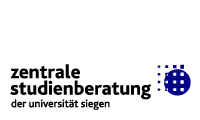Zentrale Studienberatung
im F-S Gebäude
Sandstraße 16-20
57072 Siegen
Erreichbarkeit der
studentischen Hotline:
0271 740-2712
Mo - Do: 9 - 16 Uhr
Fr: 9 - 12 Uhr
Mail:
info.studienberatung[at]
zsb.uni-siegen.de
Terminvereinbarung für eine Beratung über:
0271 740-2712
International Students
You find information about the admission procedure here:
STARTING
Impressum
Media Culture

Short Information
| Restricted
admission |
Regular
study time |
Winter
semester |
Summer
semester |
|---|---|---|---|
| no | 4 semester/
8 semester (part time) |
✔ | ✔ |
Admission procedure
Application required
You can apply here
Degree
Master of Arts
More information
Language of instruction
German
Deadlines
The degree program
The Master's degree program teaches culture-science
competence and media skills from different disciplines.
Students look at media practices in globally networked and
differentiated forms of society in research and practice in
order to make statements with an appropriate distance.
The degree program is research-oriented and pursues in
particular the target of inspiring students to conduct
independent research work in the media area on the basis of
different scientific perspectives and methods. In the degree
program, students will acquire the required qualifications in
order to take responsibility for the media knowledge of our
culture. The broad scientific training makes the graduates
competent partners in all areas operating with media.
Development and structure of the degree program:
The Master's program comprises ten modules that deal with the
intermedial and intercultural interaction of texts, images and
sounds. In eight modules, historical, theoretical and
analytical methods will be taught, supplemented by a research
colloquium and a research project.
In the degree program in media culture, students can choose
between the research-oriented subject combination program
(advanced major) and the major-minor combination (major or
minor subject). Depending on the chosen subject combination
program, only a specific number of the total of ten modules
needs to be attended.
Possible professions:
Alignment with research in the Master's degree program in media
culture not only explicitly prepares for a scientific career,
but in particular qualifies for innovative tasks in
media-related professions. This includes work in media-aligned
scientific facilities, in which in particular high
media-analytical competences are required, but also editorial
concept and consulting activities in media companies with a
research character.
Study structure
In the major-minor combination Media Culture can be combined with the following minor subjects:
- Advanced Literary Studies: Literature, Culture and Media
- History
- Language and Linguistics: German, English and Romance Languages
- Philosophy
- Social Sciences
- Theatre Pedagogy
Admission requirements
1) Completed Bachelor's degree program in a
media-sciences Bachelor's course (with at least grade 2.5 or
better)
or
2) Completed Bachelor's degree program in
other B.A. courses with a media-sciences share (with at least
grade 2.5 or better). In the second case, students must
demonstrate good knowledge of media theory, media history, and
media aesthetics or analysis to the extent of 18 credit points
(LP) in the research-oriented study model (Model A) and the
major-minor study model (Model B). As a minor subject in the
combined study model (Model B), an expected 9 LP must be
demonstrated in the above-mentioned areas.
The current examination regulations at the time shall
apply; exceptions shall be determined by the examination
board.
Study organization
Internship
An internship during the degree is recommended. A pre-internship is not necessary.
Examination regulations/degree plan/module
manuals/internship rules
Examination regulations (POs) specify the basic structures of a
degree program (e.g. admission requirements and contents to be
studied). Students are automatically subject to the current
version of their PO when they matriculate for their first
subject-related semester. This means that even if the PO
changes during their studies, the original version according to
which they matriculated will remain valid (provided that the PO
does not expire).
The respective degree plan is the recommended example progress
of the studies in individual subjects and is part of a PO.
Supplementary provisions and details for any module to be
studied can be found in the module manually (e.g. requirements
for taking a written test or content-related information on the
modules/events, ...).
The internship rules define the conditions under which the
required or optional internships must be completed.
We recommend at least looking at the study schedule for your
degree program before the lecture time starts, to ensure that
you know which modules are intended for the start of your
studies.


